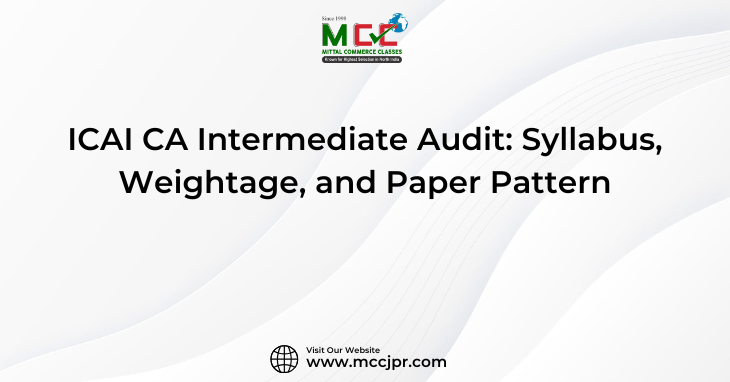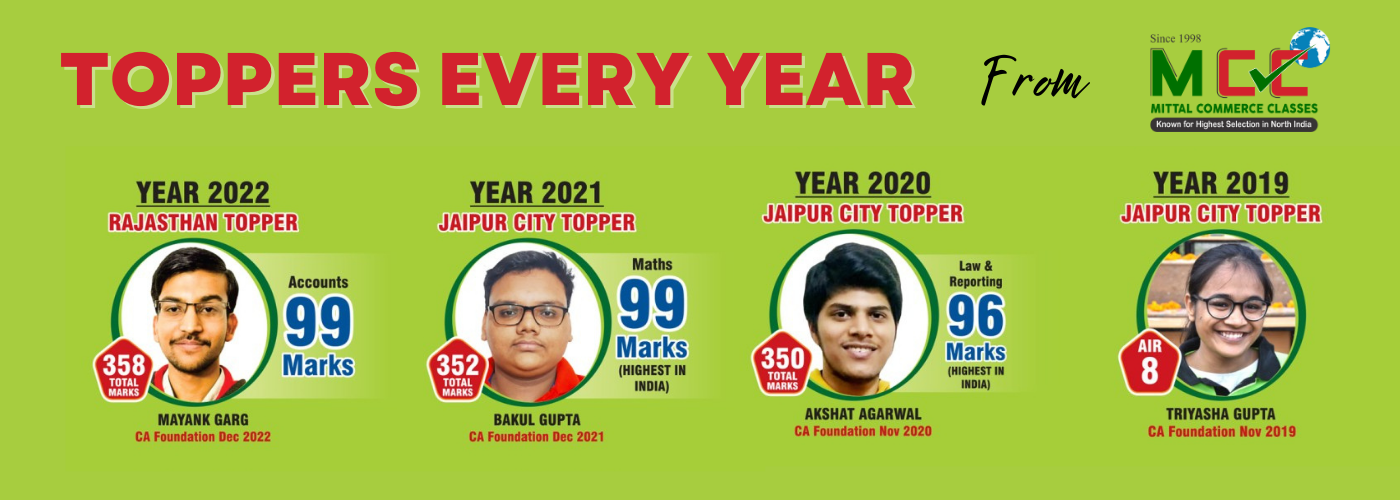Introduction
To become a CA, one must familiarize themselves with the CA Inter Audit syllabus, use time wisely, access useful study materials, seek teacher advice, complete regular practice papers, and maintain a positive mindset. The goal of this study is to provide random information as well as successful methods to pass the tests. Moreover, making use of the resource center MCC, which is known for its excellent coaching of the CA intermediate courses, also helps in improving your preparation. By closely following the rules and working hard, you can increase the prospects of your success at the CA Intermediate exam in 2024 as well.
CA Intermediate Audit Syllabus in 2024
The CA intermediate audit study material for 2024 deals with significant topics that an audit should master. They include the nature and scope of audits, planning strategy, risk assessment, audit evidence, completion and review, and ethics in audit engagements. Starting with a 4% to 20% maximum weightage, students not only need to understand each concept thoroughly but must be very well-prepared in each section as well. Except, taking the CA exam time table for 2024 into consideration can be an effective step for organising study schedules in an effective method.
Chapter: 1 Nature, Objectives, and Scope of the Audit:
Topic
- Auditing Concepts: Origin of Auditing, Meaning of Audit, Need for Audit (Benefits of Audit), Objective of the Audit, Scope of Audit, External Audit Engagements, Qualities of Auditor.
- Inherent Limitations of an Audit; Relationship of Auditing with other Disciplines.
- (SA 200: Overall Objectives of the Independent Auditor and the Conduct of an Audit in Accordance with Standards on Auditing).
Chapter: 2. Audit Strategy, Audit Planning, and Audit Program:
Topic
- (SA 300: Planning an Audit of Financial Statements)
- It is the auditor’s responsibility to plan an audit of financial statements. Benefits of audit planning.
- Planning is a continual and iterative process.
- Discussion of elements of planning with the entity’s management. Involvement of key engagement team members in planning the audit. Preliminary engagement activities.
- The auditor’s consideration of client continuance and ethical requirements. Planning activities.
- Establishing an overall audit strategy: assistance for the auditor.
- Development of an audit plan.
- Documenting the overall audit strategy, audit plan, and audit programme.
- Development of an audit plan and programme.
Chapter: 3. Risk Assessment and Internal Control:
Topic
- Audit Risk.
- Risk of Material Misstatement, Inherent Risk, Control Risk, and Detection Risk.
- Sampling and Non-Sampling Risk.
- Concept of Materiality, Materiality in Planning and Performing an Audit.
- Auditor’s responsibility to apply the concept of materiality.
- Auditor’s determination of materiality is a matter of professional
- judgement. Materiality and Audit Risk.
- Application of materiality in planning and performing the audit. Concept of Performance materiality.
- Determining materiality and performance materiality when planning the audit.
- Use of benchmarks in determining materiality for the financial statements as a whole. Materiality level or levels for particular classes of transactions, account balances, or disclosures.
- Revision in materiality as the audit progresses. Documenting the Materiality.
- (SA 320, Materiality in Planning and Performing an Audit).
- Identifying and Assessing the Risk of Material Misstatement, Risk Assessment Procedures.
- Understanding the entity and its environment; internal control.
- Documenting the risks.
- Evaluation of the internal control system.
- Testing of Intemal Control: Intemal Control and IT Environment (SA 315: Identifying and Assessing the Risks of Material Misstatement Through Understanding the Entity and Its Environment).
- Digital Audit: Key Features, Impact of IT-Related Risks, Impact on Controls, Internal Financial Controls as Per Regulatory Requirements, Types of Controls, Audit approach, Understanding and documenting an automated environment, Testing methods, data analytics for audits, and assessing and reporting audit findings.
- Overview and Introduction: The Auditor’s Responses to Assessed Risks (SA 330).
Chapter: 4. Audit Evidence:
Topic
- Meaning of audit evidence.
- Relevance and reliability of audit evidence; sufficient and appropriate audit evidence; meaning of assertions.
- Assertions are contained in the financial statements. Source of audit evidence.
- Test of controls.
- Substantive Procedures Test of details and substantial analytical procedures; audit procedures for obtaining audit evidence.
- Evaluation of Audit Evidence (SA500 Audit Evidence), Audit Traill (Using the Work of Internal Auditors, SA 610)
- Internal audit function.
- External Auditor’s Responsibility for the Audit, Evaluating the Internal Audit Function
- The Basics of Internal Financial Control and Reporting Requirements Distinction between Internal Financial Control and Internal Control over Financial Reporting
- Audit Sampling (SA 530 Audit Sampling). The Meaning of Audit Sampling
- Designing an audit sample: Types of sampling (Approaches to Sampling)
- Sample size and selection of items for testing, sample selection method
- Obtaining evidence of the existence of inventory, Audit procedure to identify tigation and claims, obtaining evidence regarding the presentation and disclosure of segment information (SA 501 Audit Evidence Specific Considerations for Selected Items), External confirmation procedures Management’s refusal to allow the auditor to send a confirmation request Negative Confirmations (SA 505 External Confirmations); Audit evidence about opening balances Accounting policies relating to opening balances: Reporting with regard to opening balances (SA510 Initial Audit Engagements Opening Balances)
- Meaning of Related Party: Nature of Related Party Relationships and Transactions: Understanding the Entity’s Related Party Relationships and Transactions (SA 550 Related Parties)
- Analytical Procedures
- Meaning, nature, purpose, and timing of analytical procedures Substantive analytical procedures.
- Designing and performing analytical procedures prior to the audit
- Investigating the results of analytical procedures (SA 520 Analytical Procedures)
Chapter: 5. Audit of Items Financial Statements
Topic
- Audit of sale of products and services; Audit of interest income; Rental Income, Dividend Income; Netgain/Loss on Sale of Investments, etc.
- Audit of Purchases, Employee Benefits Expenses, Depreciation, and Interest Expenses Expenditure on Power & Fuel, Rant, Repair to Building, Repair to Machinery, Insurance, Taxes, Travelling Expenses, Miscellaneous Expenses, etc.
- Audit of Share Capital Reserve and Surplus, Long Term Borrowings, Trade Payables, Provisions, Short Term Borrowings, and Other Current Liabilities
- Audit of Land Buildings, Plants and Equipment, Fumiture and Fixtures, Vehicles, Office Equipment, Goodwill, Brands and Trademarks, and Computer Software
- Audit of Loans and Advances, Trade Receivables, Inventories, Cash and Cash Equivalents, Other Current Assets, and Audit of Contingent Liabilities.
Chapter: 6. Audit Documentation
Topic
Concepts of Audit Documentation
Nature and Purpose of Audit Documentation Form, Content, and Extent of Audit Documentation. Completion Memorandum.
Ownership and custody of Audit documentation (SA 230 Audit Documentation)
Must Read: CA Articleship 2024: Registration, Period, Stipend, And Firms
Chapter: 7. Completion and Review
Topic
The Meaning of Subsequent Events:
Auditor’s obligations in different situations of subsequent events
Procedures for subsequent events. (SA 560, Subsequent Events)
Responsibilities of the Auditor with Regard to Going Concern Assumption Objectives of the Auditor Regarding Going Concern.
Events or conditions that may cast doubt about Going Concem Assumption
Audit Procedures when Events or Conditions are Identified (SA 570) Going Concem. Overview and
Introduction of Evaluations of Misstatements Identified During the Audit (SA 450)
Written Representations as Audit Evidence
Objectives of the Auditor in a Negarding Written Representation
Management from whom written representations may be requested.
Written Representations about Management’s Responsibilities (SA 580 Written Representations)
Overview and Introduction of SA 260 Communication with Those Charged with Governance
Overview and Introduction of SA 265: Communicating Deficiencies in Internal Control to Those Charged with Governance and Management
Chapter: 8. Audit Report
Topic
- Forming an opinion on the financial statement
- Auditor’s Report basic elements (SA 700: Forming an Opinion and Reporting on Financial Statements).
- Communicating key Audit matters in the independent auditor’s report (SA 701) Types of Modified Opinions and Circumstances When a Modification to the Auditor’s Opinion is Required Qualitied Adverse Disclaimer of Opinion (SA 705 Modification to the Opinion in the Independent Auditor’s Rep
- SA 706: Emphasis of Matter Paragraphs and Other Mattar Paragraphs in the Independent Auditor’s Report
- Nature of Comparative Information,
- Corresponding Figure, Comparative Financial Statements (SA Figures, Comparative Information, Corresponding Figures, and Comparative Financial Statements).
- Branch audit, joint audit; reporting requirements under the Companies Act, 2013, including CARO.
Chapter: 9. Special Features of Audits of Different Types of Entities
Topic
Appointment of Auditor, Audit Procedure, and Audit Report with Respect to Different Categories of Entities: Government; local bodies: Not-for-profit organisations, trusts and societies, partnership firms, Audit of different types of undertakings, i.e., educational institutions, hotels, clubs, hospitals, etc., Basics of Limited Liability Partnerships (LLPS) Audit and Co-operative Societies Audit
Chapter: 10. Audit of Banks
Topic
Understanding the accounting system in banks, the audit approach, the audit of revenue items, and special considerations in bank audits with an emphasis on advances and NPAs.
Chapter: 11. Ethics and Terms of Audit Engagements
Topic
Meaning of ethics.
Ethics is a state of mind; there is a need for professional ethics.
Principles based approach vs. rules-based approach (ethical or legal).
The fundamental principles of professional ethics are integrity, objectivity, professional competence and due care, confidentiality, and professional behaviour.
Independence of auditors.
Threats to Independence. Self-interest threats, self-review threats, advocacy threats, familiarity threats, and intimidation threats.
Safeguards to Independence; Professional Scepticism; Terms of Audit Engagements Preconditions for an audit: Audit engagement.
Agreement on Audit Engagement Terms.
Terms of Engagement in Recurring Audits (SA 210, Agreeing the Terms of Audit Engagements).
Overview and Introduction of SQC 1 Quality Control for Firms that Perform Audits and Reviews of Historical Financial Information and Other Assurance and Related Services Engagements
Overview and Introduction of SA 220: Quality Control for an Audit of Financial Statements.
CA Intermediate Audit Weightage in 2024 (100 MARKS)
Here’s a table summarising the weightage of the Auditing and Ethics paper for the CA Intermediate Audit :
| Subject | Weightage |
|---|---|
| 1. Nature, Objective and Scope of Audit | 4%-6% |
| 2. Audit Strategy, Audit Planning and Audit Program | 8%-12% |
| 3. Risk Assessment and Internal Control | 8%-12% |
| 4. Audit Evidence | 12%-18% |
| 5. Audit of Items of Financial Statements | 12%-20% |
| 6. Audit Documentation | 12%-18% |
| 7. Completion and Review | 8%-12% |
| 8. Audit Report | 8%-12% |
| 9. Special Features of Audit of Different Type of Entities | 12%-18% |
| 10. Audit of Banks | 12%-18% |
| 11. Ethics and Terms of Audit Engagements | 8%-10% |
CA Intermediate Audit Paper Pattern in 2024
The CA Intermediate Exam Pattern in 2024 includes both subjective and objective tests as well. The exam is in offline mode, and candidates can generally choose to answer in English or Hindi. Moreover, there is no penalty for wrong answers. The total number of marks for the test is 100, and the time allowed is 3 hours. The test is conducted on the basis of the CA Intermediate syllabus.
| CA Intermediate Exam Pattern for 2024 | |
| Exam Name | CA Intermediate 2024 |
| Type Of Questions | Both Subjective and Objective Papers |
| Mode | Offline |
| Language | English / Hindi |
| Negative Marking | No |
| Total Marks | 100 |
| Exam Duration | 3 Hours |
Study Guide for the CA Intermediate in 2024
For prospective CA Intermediate candidates in 2024, here’s a thorough study guide to succeed in the examination:
Understanding the CA Intermediate Course: Before going into the depths, take a proper look at the CA intermediate syllabus and pattern of exams. Get an understanding of the subjects and topics that will be covered to allow you to effectively study.
Effective Time Management: Schedule your study plan to accommodate each subject and topic at a certain time. Click here to see previous questions about sentence enhancement. Concentrate on content that you have acute difficulty with, and do not reduce the significance of thorough revision before the exam.
Quality Study Material: Make use of trusted study materials, such as those recommended by experts or provided by coaching centres, as they add value to the learning process. See to it the material incorporates all the syllabus-related points and contains practice questions and mock tests appropriate for self-assessment.
Seek Guidance from Experts: Finding a renowned institute for the CA Intermediate preparation could be beneficial for your further journey. In terms of positioning, MCC is the best CA intermediate coaching in India. Ask people who either used to be or are currently taking the courses that you are taking for advice and feedback on effective methods for exam preparation.
Regular Practice and Revision: Practice different types of problems often to gain a solid grip on the different concepts and also exercise critical and analytical skills. Utilize the revision block for recalling key topics as well as the formula that you study.
Mock Tests and Previous Year Papers: Study all mock tests and question papers from the previous years. Implement them in your regular study routine. By this of resources you can properly orient yourself to the exam system, identifying your weak connections, and practise time management.
Stay Motivated and Positive: Accept a success-oriented attitude in all stages of your preparation. With determination, stay focused by setting attainable goals, celebrating milestones, and imagining the accomplishment.
Using this study guide and exploiting opportunities like choosing MCC for CA Intermediate coaching, you can step up your preparation and increase your chances of passing the next CA Intermediate in 2024.
Preparation Strategies for the CA Intermediate Exam Paper
To effectively prepare for the CA Intermediate exam paper, consider the following strategies:
Thorough Knowledge of the Syllabus: Get acquainted with the studied course programme. Get familiar with the presented topics in each subject together with putting more emphasis on the directions in which you require improvement.
Structured Study Plan: Develop a planned approach that consists of clearing all the topics and subjects within the periods allowed for studying. Create an outline of all the syllabus parts and adopt a convenient schedule with limited objectives for every study session.
Practice with mock test papers: Get your readiness for CA Intermediate mock test papers to determine the stage of your preparation. Practice exams are great at pointing out your strengths and weaknesses, helping you make your weak areas better, and assisting in improving your temporal abilities.
Revision and Consolidation: Besides the usual, be sure to revise previous topics that you have already covered so as to refresh your memory. Grouping together the important definitions, formulas, and examples of worked out problems into a revision sheet.
Stay Updated with Exam Timetable: Apply yourself to the dates of the banks of financing to fit your efforts to study for the next year. One of the main tasks you have to do in your first year is to be aware of exam dates and evaluate how much time you will need to review each exam after.
Seek Guidance and Clarification: It is not advisable to underestimate the need to ask for help when you face an issue. You can always reach out to trainers, mentors, or online sources. A quick resolution of doubts is needed to ensure that students grasp the topics taught well.
Stay consistent and motivated: Maintain the frequency of your study oriented activities, and do not relent in your studies just because you now have an exam in a few days. Be proud of the little victories and keep your sights fixed on the fulfilment of your dreams.
By doing so, you will have the CA Inter Mock test papers and timetable for reserves to be more prepared on the CA Intermediate exam day, which will give you a better chance to pass.
Why should you choose MCC Coaching Classes for CA Intermediate?
Mittal Commerce Class was founded in 1998 by CA Manoj Gupta with the objective of providing top excellent classes for future chartered accountants. Our institution has faculties who are adept and knowledgeable in solving issues around CA exams. We provide CA online classes and learning materials for the convenience of students, who can study whenever they want and wherever they feel comfortable. We will prepare your learning materials with the help of experts with many years of successful teaching experience and up-to-date knowledge of CA exam syllabus. Also, our team is always ready to give their advice and guide the students through the exam process in the most effective way. In addition to being affordable, our classes are of top quality. Do not postpone and start now; it is time to enter a CA coaching class to achieve your goals.
Frequently Asked Questions
1. What is the highest-scoring subject in CA Intermediate?
Accounting is regarded as a high-scoring subject in the CA Intermediate exam.
2. Can I get a job after CA Inter?
After completing the CA Inter, one can become an internal auditor for a corporation, but regulations vary, stating that only a certified Chartered Accountant can function as an internal auditor.
3. Which field is best for CA?
A chartered accountant (CA) offers numerous financially rewarding career options, including internal audit, tax audit, statutory audit, finance controller, forensic auditing, management consulting, and treasury, as a certified accounting professional.
4. How many levels of the exam are there for CA?
ICAI conducts three levels of CA exams: Foundation, Intermediate, and Final, granting a Chartered Accountant certificate upon completion of each level.
Also Read: CA Foundation Business Economics Paper 2024












